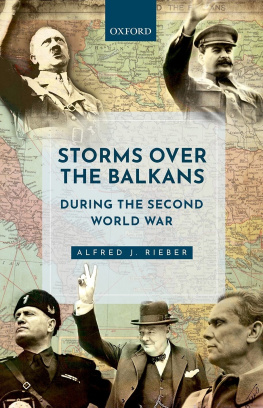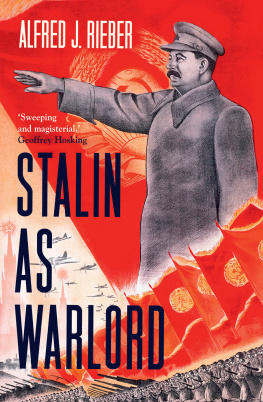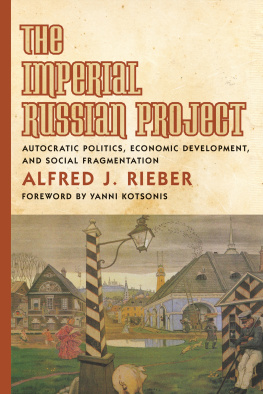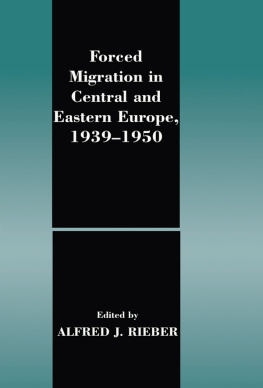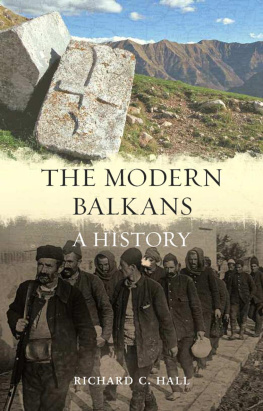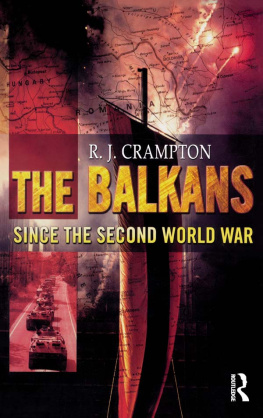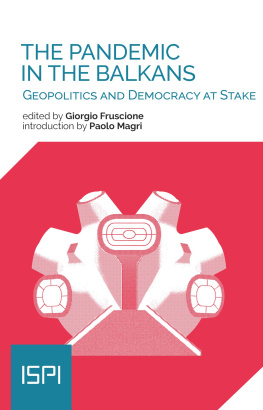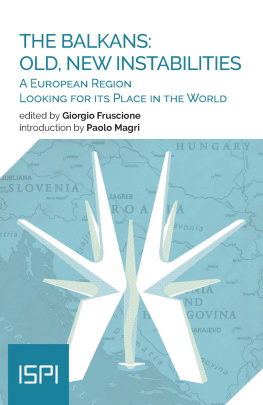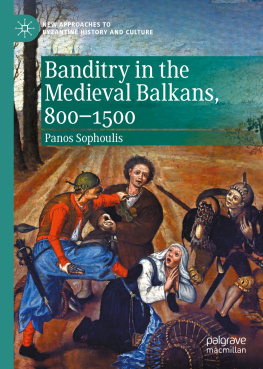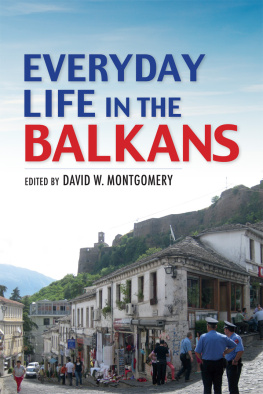Storms over the Balkans During the Second World War
To my students on two continents

Great Clarendon Street, Oxford, OX2 6DP, United Kingdom
Oxford University Press is a department of the University of Oxford. It furthers the Universitys objective of excellence in research, scholarship, and education by publishing worldwide. Oxford is a registered trade mark of Oxford University Press in the UK and in certain other countries
Alfred J. Rieber 2022
The moral rights of the author have been asserted
First Edition published in 2022
Impression: 1
All rights reserved. No part of this publication may be reproduced, stored in a retrieval system, or transmitted, in any form or by any means, without the prior permission in writing of Oxford University Press, or as expressly permitted by law, by licence or under terms agreed with the appropriate reprographics rights organization. Enquiries concerning reproduction outside the scope of the above should be sent to the Rights Department, Oxford University Press, at the address above
You must not circulate this work in any other form and you must impose this same condition on any acquirer
Published in the United States of America by Oxford University Press
198 Madison Avenue, New York, NY 10016, United States of America
British Library Cataloguing in Publication Data
Data available
Library of Congress Control Number: 2022934368
ISBN 9780192858030
ebook ISBN 9780192672797
DOI: 10.1093/oso/9780192858030.001.0001
Printed and bound in the UK by
TJ Books Limited
Links to third party websites are provided by Oxford in good faith and for information only. Oxford disclaims any responsibility for the materials contained in any third party website referenced in this work.
Preface and Acknowledgements
The idea for this book has been long maturing. It brings together vivid memories connecting me to the life of the Balkans. Imagine then a summer day in 1996 during the early days of the NATO intervention in the Yugoslav Wars. I was strolling along the Danube corso with a Hungarian gentleman of my acquaintance when three young American soldiers in camouflage uniforms passed by. They were enjoying a moment of rest and relaxation. My companion stopped to look at them and then turned to me: Ah the Americans! he said, then paused; at last!
That remark in turn called up another memory when thirty-five years earlier I paid my first visit to Budapest on the way back from the Soviet Union. I was not in uniform or in the army, but I might as well have been, given the warm welcome I received everywhere I went: an American at last!
On the eve of the Yugoslav Wars, I was invited to become chair of the History Department at the Central European University in Budapest, the first and to date only American to hold that position. I was not unprepared. Trained as a historian of Russia and the Soviet Union at the Russian Institute in Columbia University, I gained a comparative perspective from Otakar Odloilic in the history of Poland and Danubian Europe and Halil Inalcik in Ottoman history. Teaching at Northwestern University, I learned much from my colleague, Leften Stavrianos, who had just completed his magisterial work The Balkans. When I returned to Budapest in 1995, my colleague there, Ivo Banac, had just been appointed director of the Institute for Southeastern Europe. My first task was to draft what became the first doctoral program at the CEU. It was approved by the Board of Regents of New York State and the Hungarian Academy of Science as The Comparative of Eastern, Central and Southeastern Europe (as we then referred to the Balkans).
By introducing the concept of comparative history we sought to engage the students in ongoing discussions over the commonalities and differences in the historical experiences of the three regions as an alternative to narrow nationalist interpretations. To the same end, we invited scholars from the three regions as visiting professors to teach problem-oriented courses rather than national histories. My own education continued when I participated in the research project of Drago Roksandi of Zagreb University on the Triplex Confinium and in a jointly taught doctoral colloquium on the Comparative History of the three regions with Roksandi and Jii Musil of Charles University in Prague. Students in my course on the Second World War helped further to broaden my understanding of the complexities of Balkan history. In class discussions, they frequently invoked vivid family memories of the painful war years. Together we worked at making connections with long-term historical processes that characterized the region as a whole. The Second World War began to emerge in my mind as a cataclysmic culmination of these processes. I perceived more clearly the legacy that continued to press heavily on the lives of my students, their families, and entire societies in the region. This realization has shaped the thesis of this book.
Acknowledgements
Among my many intellectual debts happily acquired over the years, there are some that deserve special mention for having helped to make this a better book. The contribution of the late Ivo Banac to the final version was nothing less than transformative. He subjected an early draft to an unvarnished critique to quote his favorite expression. He recommended changes that enlarged the focus from the Adriatic and Western Balkans to the region as a whole. Thanks to his careful reading, numerous errors were corrected; he raised important, demanding, clear answers. Even during his final illness, he was making suggestions to improve the manuscript. I also much appreciated suggestions and corrections to an earlier draft by Silvio Pons, James Sheehan, Norman Naimark, and Ulf Brunnbauer. Stefan Berger critiqued the section on Hitler. Geoffrey Hosking commented on the entire manuscript from his broad European perspective. The origins of the book go back to an invitation by my colleague, Drago Roksandi, to join his project on Triplex confinium, where thanks to the stimulating discussions and publication I first conceived the idea of developing the idea of the imperial struggle over Balkan frontiers in the early modern period into the twentieth century. I was fortunate in supervising the work of doctoral students at CEU who went on to make their own contributions to the history of the region, some of which are cited in this book, most notably Viktor Taki and Andrei Cusco. Among the CEU students and graduates who also provided valuable assistance as research assistants, I am indebted to Vladimir Sotirovi and Kralj Lovra. Marco Bresciani and Stefan Guvica generously shared sources from their own work and pointed the way to others. Comments by the anonymous readers of Oxford University Press helped me strengthen the structure and argument of the book. I am grateful to Katie Bishop of Oxford University Press for her interest, support, and efficiency.
The research and writing of this book over many years were supported by grants from IREX, the National Council for Russian and East European Research and the Research Support Scheme of the Central European University. The staff of the CEU Library has been an invaluable resource in ordering books and obtaining materials through Inter-library loan. I would like to single out Vit Lukas for his resourcefulness and energy in responding to my requests to track down and make available elusive articles and documentary collections from libraries in Germany and Russia.

